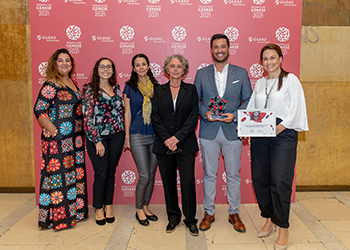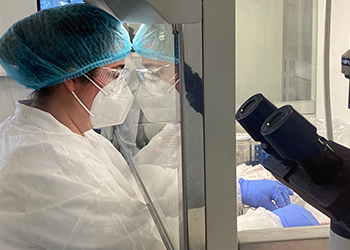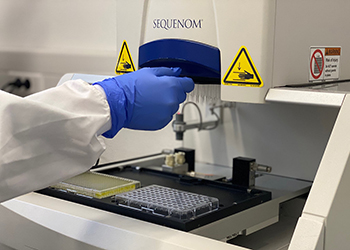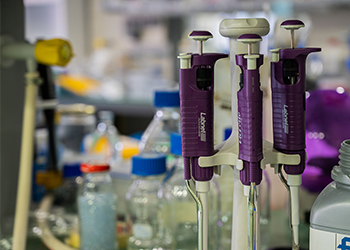
Lymphocyte Physiology
Jocelyne Demengeot
The research group, led by Jocelyne Demengeot, is concerned with those properties of the immune system that guarantee tissue integrity as well as tolerance to commensals and food antigens while maintaining the ability to mount efficient responses to infectious agents and some tumours. Rooted in this thematic is also the biological puzzle of phenotypic heterogeneity, the challenge of personalised medicine.
The research group approach the cellular and molecular bases of immune regulation through the analysis of various mouse models, notably of spontaneous or induced autoimmune and immuno-pathological inflammation.
Closer to the clinic, they interrogate the biological basis of the most extreme manifestations in autoimmune diseases and of the variable efficacy of immunotherapies.
Projects
A subset of T cells, expressing the transcription factor Foxp3, dampens immune responses in an antigen specific manner. These cells are first selected in the thymus through interaction with MHC-peptide expressed locally and therefore encompass a TCR repertoire enriched in self-reactivities. Yet, a wide array of molecules produced by commensals, brought in by food or expressed by the fetuses is also tolerated by the immune system. This paradox calls for a formal evaluation of the rules governing Treg differentiation, their maintenance and expansion as well as their domain of competences. Our specific aims are: 1) to establish the origin of the antigens that drive regulatory T cells differentiation; 2) to establish the origin of regulatory T cell specific to strictly peripheral antigens; 3) along with the hygiene theory, to test the role of the microbiota in modulating immune tolerance; 4) to asses the role of B cells and B cell products in the control of T cell homeostasis. Building from the finding produced by these investigations we aim at improving peptide therapies for autoimmune disease.
The use of specific monoclonal Antibodies, a class of “biologicals”, in the treatment of autoimmune patients has provided spectacular clinical results. However a large fraction of patients develop an immune response against the drug and produce antibodies reverting the benefit of the therapy. We aim at assessing the relevance of drug immunogenicity in clinical practice in Portugal.
The adaptive immune system of the jawed vertebrates emerged about 500 million years ago involving, as a major novelty, the somatic generation of an extremely large diversity of antigen receptors by a mechanism of site specific DNA recombination. The Rags introduce DNA breaks at specific sequences – named Recombination Signal Sequences (RSS) found at the border of a large set of gene segments. RSS are composed of either 28 or 39 nucleotides, of which only few are conserved. Given this degeneracy, RSS-like sequences can be identified outside the antigen receptor loci. Such “cryptic-RSS” (cRSS) have been occasionally tested, shown to support Rag mediated recombination and involved in the emergence of some lymphoid tumors. With the aim to formally establish the frequency, efficiency and nature of cRSS in the genome, we joined with five other groups to combine experimental, bio-informatic and mathematical approaches to perform unbiased large-scale analyses.
Project number 72558 | Code: LISBOA-01-0145-FEDER-072558
Project summary
The project consists of reducing the diagnosis time of SARS-CoV-2, maintaining high sensitivity and specificity, as well as independence from ready-to-use kits and reagents. To this end, the IGC will strengthen its level 2 biosafety laboratory capacity for human samples and pseudo-virus handling and create a new level 3 biosafety laboratory for robust validation of the developed assays.
Co-financed by:

Publications
- Faro-Viana, J., Bergman, ML., Gonçalves, L.A., Duarte N., Coutinho T.P., Borges P.C., Diwo C., Castro R., Matoso P., Malheiro V., Brennand A., Kosack L., Akpogheneta O., Figueira J.M., Cardoso C., Casaca A.M., Alves P.M., Nunes T., Penha-Gonçalves C. & Demengeot J. (2022) Population homogeneity for the antibody response to COVID-19 BNT162b2/Comirnaty vaccine is only reached after the second dose across all adult age ranges. Nature Communications 13:140
- Almeida-Santos, J., Bergman, M.L. ,Cabra,I.A. and Demengeot, J. (2021) Interruption of Thymic Activity in Adult Mice Improves Responses to Tumor Immunotherapy. J Immunol 206 (5):978-986
- Bergman, M.L., Lopes-Carvalho, T., Martins, A.C., Grieco, F.A., Eizirik, D.L., Demengeot, J. (2017) Tolerogenic insulin peptide therapy precipitates type 1 diabetes.. J Exp Med. 214(7):2153-2156
- Passagem-Santos, D., Bonnet, M., Sobral, D., Trancoso, I., Silva, J.G., Barreto, V.M., Athanasiadis, A., Demengeot, J., Pereira-Leal, J.B. (2016) RAG Recombinase as a Selective Pressure for Genome Evolution.. Genome Biol Evol. 8(11):3364-3376
- Barroso-Batista, J., Demengeot, J., Gordo, I. (2015) Adaptive immunity increases the pace and predictability of evolutionary change in commensal gut bacteria.. Nat Commun. 30(6):8945
- Garcês, S., Antunes, M., Benito-Garcia, E., da Silva, J.C., Aarden, L., Demengeot, J. (2014) A preliminary algorithm introducing immunogenicity assessment in the management of patients with RA receiving tumour necrosis factor inhibitor therapies. Ann Rheum Dis. 73(6):1138-43
- Lino, A.C., Mohr, E., Demengeot, J. (2013) Naturally secreted immunoglobulins limit B1 and MZ B-cell numbers through a microbiota-independent mechanism. Blood 122(2):209-18
- Paiva, R.S., Lino, A.C., Bergman, M.L., Caramalho, I., Sousa, A.E., Zelenay, S., Demengeot, J. (2013) Recent thymic emigrants are the preferential precursors of regulatory T cells differentiated in the periphery. Proc Natl Acad Sci U S A 110(16):6494-9
- Zelenay, S., Bergman, M.L., Paiva, R.S., Lino, A.C., Martins, A.C., Duarte, J.H., Moraes-Fontes, M.F., Bilate, A.M., Lafaille, J.J., Demengeot, J. (2010) Intrathymic differentiation of adaptive Foxp3+ regulatory T cells upon peripheral proinflammatory immunization. Cutting Edge-Journal of Immunology 185:3829-33
- Duarte, J.H., Zelenay, S., Bergman, M.L., Martins, A.C., Demengeot, J. (2009) Natural Treg cells spontaneously differentiate into pathogenic helper cells in lymphopenic conditions. Eur J Immunol 39(4):948-55
- Zelenay, S., Lopes-Carvalho, T., Caramalho, I., Moraes-Fontes, M. F., Rebelo, M.l, Demengeot, J. (2005) Foxp3+ CD25- CD4 T cells constitute a reservoir of committed regulatory cells that regain CD25 expression upon homeostatic expansion. Proc Natl Acad Sci U S A 102:4091-4096
- Caramalho, I., Carvalho, T., Ostler, D., Zelenay, S., Haury, M., Demengeot, J. (2003) Regulatory T cells selectively express Toll Like Receptors and are activated by Lipopolysaccharide. J Exp Med. 197:403-411



